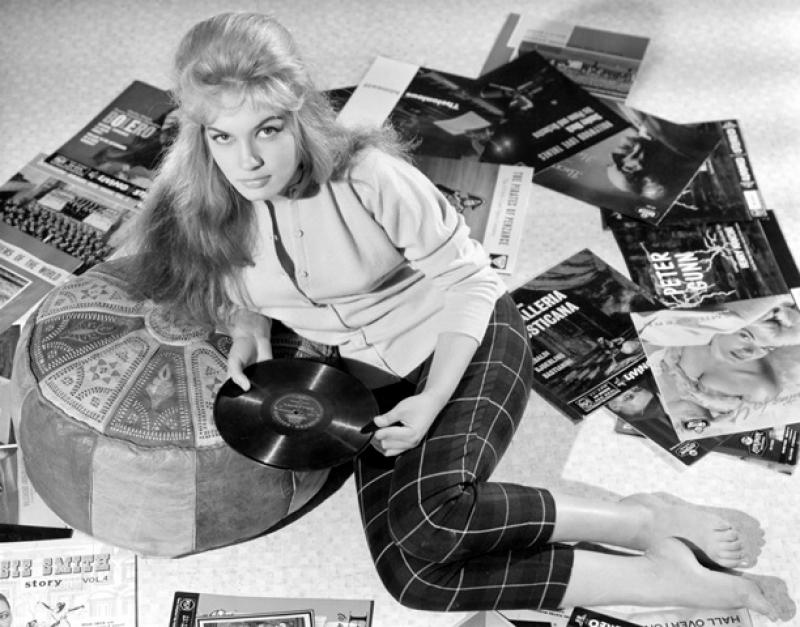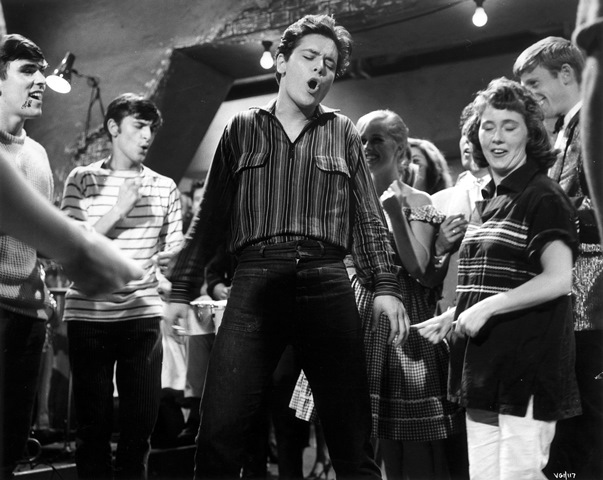DVD: Beat Girl, Expresso Bongo | reviews, news & interviews
DVD: Beat Girl, Expresso Bongo
DVD: Beat Girl, Expresso Bongo
Unruly teens, pop music, Soho and titillation in a pair of British exploitation classics

“All over the world, young people between the ages of 14 and 20 gradually spend more and more of their time away from the good influences of their homes and schools.
The double-handed release of Expresso Bongo and Beat Girl brings a fine chance to entertainingly look at how low-budget British cinema dealt with the burgeoning threat posed by unruly teenagers. Each places a lot of its action in seedy Soho and its iniquitous coffee bars. Both feature highly racy sequences with strippers: almost bare breasts and the odd bottom are seen. This, then, is exploitation cinema.
 Expresso Bongo is the just about more serious of the two films as it adapts a 1958 Wolf Mankowitz stage satire about Tommy Steele, Britain’s first popular rock ‘n’ roller. Its director is the reliably great Val Guest. In short, it is the British Kwik Save take on Sweet Smell of Success and stars a maybe amphetamine-powered Lawrence Harvey as the always on-the-make Soho shyster Johnny Jackson. His girlfriend is stripper-come-exotic dancer Maisie King (played against type by a wonderful Sylvia Syms). Fittingly, considering its inspiration, Bert Rudge aka Bongo Herbert, who Jackson turns into a pop star, is played by a nuanced Cliff Richard (pictured right). An improbably young Shadows are seen in the film. Expresso Bongo is a hoot, and essential. But at 111 minutes, it is far too long, Harvey wears out his welcome and the forward flow is interrupted by lumpy musical-type songs. Despite the film’s indispensability it would merit three stars due to these shortcomings, but this package is chock full with class extras (one of which is Michael Winner’s first film, the 1957 poignant short The Square). Four stars.
Expresso Bongo is the just about more serious of the two films as it adapts a 1958 Wolf Mankowitz stage satire about Tommy Steele, Britain’s first popular rock ‘n’ roller. Its director is the reliably great Val Guest. In short, it is the British Kwik Save take on Sweet Smell of Success and stars a maybe amphetamine-powered Lawrence Harvey as the always on-the-make Soho shyster Johnny Jackson. His girlfriend is stripper-come-exotic dancer Maisie King (played against type by a wonderful Sylvia Syms). Fittingly, considering its inspiration, Bert Rudge aka Bongo Herbert, who Jackson turns into a pop star, is played by a nuanced Cliff Richard (pictured right). An improbably young Shadows are seen in the film. Expresso Bongo is a hoot, and essential. But at 111 minutes, it is far too long, Harvey wears out his welcome and the forward flow is interrupted by lumpy musical-type songs. Despite the film’s indispensability it would merit three stars due to these shortcomings, but this package is chock full with class extras (one of which is Michael Winner’s first film, the 1957 poignant short The Square). Four stars.
Beat Girl is crackers. Its star is the Bardot-esque Gillian Hills as the bad bad bad Jennifer. Angry and armed with a catering-sized pout, she’s hot and bothered about her straight-laced father’s new hottie of a wife, the French lady Nichole. Instead of sleeping at night, Jennifer heads off unbeknownst to dad and step-mum to Soho’s coffee bars. The high-octane Hills, later to be a pop star of sorts in France, is incredible. She was also lustrous in Blow Up (where her pubic hair became the first to be passed by the British censor) and Clockwork Orange. The fact that it sports the first cinema score by John Barry helped Beat Girl to achieve immortality. Adam Faith provides the requisite contemporary pop star quotient by featuring as Dave, the archetypal and brooding conflicted youth. Oliver Reed also passes across the screen. Christopher Lee is a toweringly sleazy night club owner not bothered about Jennifer being under age, and is also seen in the bizarre short film Cross-Roads (1955), included as an extra. A sound four stars.
Both releases are issued as dual format DVD and Blu-ray packages with brilliant image quality (Beat Girl has previously looked terrible on home cinema releases), include alternate versions of the features and have booklets with diligent and insightful essays. Even without the extras each would be a must, but now they're unmissable.
rating
Share this article
The future of Arts Journalism
You can stop theartsdesk.com closing!
We urgently need financing to survive. Our fundraising drive has thus far raised £49,000 but we need to reach £100,000 or we will be forced to close. Please contribute here: https://gofund.me/c3f6033d
And if you can forward this information to anyone who might assist, we’d be grateful.

Subscribe to theartsdesk.com
Thank you for continuing to read our work on theartsdesk.com. For unlimited access to every article in its entirety, including our archive of more than 15,000 pieces, we're asking for £5 per month or £40 per year. We feel it's a very good deal, and hope you do too.
To take a subscription now simply click here.
And if you're looking for that extra gift for a friend or family member, why not treat them to a theartsdesk.com gift subscription?
more Film
 Islands review - sunshine noir serves an ace
Sam Riley is the holiday resort tennis pro in over his head
Islands review - sunshine noir serves an ace
Sam Riley is the holiday resort tennis pro in over his head
 theartsdesk Q&A: actor Sam Riley on playing a washed-up loner in the thriller 'Islands'
The actor discusses his love of self-destructive characters and the problem with fame
theartsdesk Q&A: actor Sam Riley on playing a washed-up loner in the thriller 'Islands'
The actor discusses his love of self-destructive characters and the problem with fame
 Honey Don’t! review - film noir in the bright sun
A Coen brother with a blood-simple gumshoe caper
Honey Don’t! review - film noir in the bright sun
A Coen brother with a blood-simple gumshoe caper
 The Courageous review - Ophélia Kolb excels as a single mother on the edge
Jasmin Gordon's directorial debut features strong performances but leaves too much unexplained
The Courageous review - Ophélia Kolb excels as a single mother on the edge
Jasmin Gordon's directorial debut features strong performances but leaves too much unexplained
 Blu-ray: The Graduate
Post #MeToo, can Mike Nichols' second feature still lay claim to Classic Film status?
Blu-ray: The Graduate
Post #MeToo, can Mike Nichols' second feature still lay claim to Classic Film status?
 Little Trouble Girls review - masterful debut breathes new life into a girl's sexual awakening
Urska Dukic's study of a confused Catholic teenager is exquisitely realised
Little Trouble Girls review - masterful debut breathes new life into a girl's sexual awakening
Urska Dukic's study of a confused Catholic teenager is exquisitely realised
 Young Mothers review - the Dardennes explore teenage motherhood in compelling drama
Life after birth: five young mothers in Liège struggle to provide for their babies
Young Mothers review - the Dardennes explore teenage motherhood in compelling drama
Life after birth: five young mothers in Liège struggle to provide for their babies
 Blu-ray: Finis Terrae
Bleak but compelling semi-documentary, filmed on location in Brittany
Blu-ray: Finis Terrae
Bleak but compelling semi-documentary, filmed on location in Brittany
 Oslo Stories Trilogy: Sex review - sexual identity slips, hurts and heals
A quietly visionary series concludes with two chimney sweeps' awkward sexual liberation
Oslo Stories Trilogy: Sex review - sexual identity slips, hurts and heals
A quietly visionary series concludes with two chimney sweeps' awkward sexual liberation
 Sorry, Baby review - the healing power of friendship in the aftermath of sexual assault
Eva Victor writes, directs and stars in their endearing debut feature
Sorry, Baby review - the healing power of friendship in the aftermath of sexual assault
Eva Victor writes, directs and stars in their endearing debut feature
 Blu-ray: Who Wants to Kill Jessie?
Fast-paced and visually inventive Czech comedy
Blu-ray: Who Wants to Kill Jessie?
Fast-paced and visually inventive Czech comedy
 Oslo Stories Trilogy: Love review - freed love
Gay cruising offers straight female lessons in a heady ode to urban connection
Oslo Stories Trilogy: Love review - freed love
Gay cruising offers straight female lessons in a heady ode to urban connection

Add comment